Impact of Corporate Social Responsibility on Business Organizations
VerifiedAdded on 2022/09/14
|11
|2942
|19
Report
AI Summary
This report presents a critical literature review on the impact of Corporate Social Responsibility (CSR) on business organizations. The research delves into the definition and significance of CSR, emphasizing its role in fostering social accountability and addressing economic, social, and environmental concerns. The methodology involves a systematic review of literature, employing various approaches such as content analysis, citation analysis, and website analysis to gather relevant information. The report highlights key themes related to CSR, including its impact on business strategies, stakeholders, and the environment. It explores existing knowledge of CSR, examining its effects on business operations, customer attraction, and financial performance. Furthermore, the report discusses key theories of CSR, such as stakeholder theory, shareholder value theory, and business ethics theory. It also identifies a research gap in the current literature, indicating areas for further investigation. The report concludes by summarizing the key findings and emphasizing the importance of CSR in contemporary business practices.

Methods 1
Business Research Methodology
Business Research Methodology
Paraphrase This Document
Need a fresh take? Get an instant paraphrase of this document with our AI Paraphraser
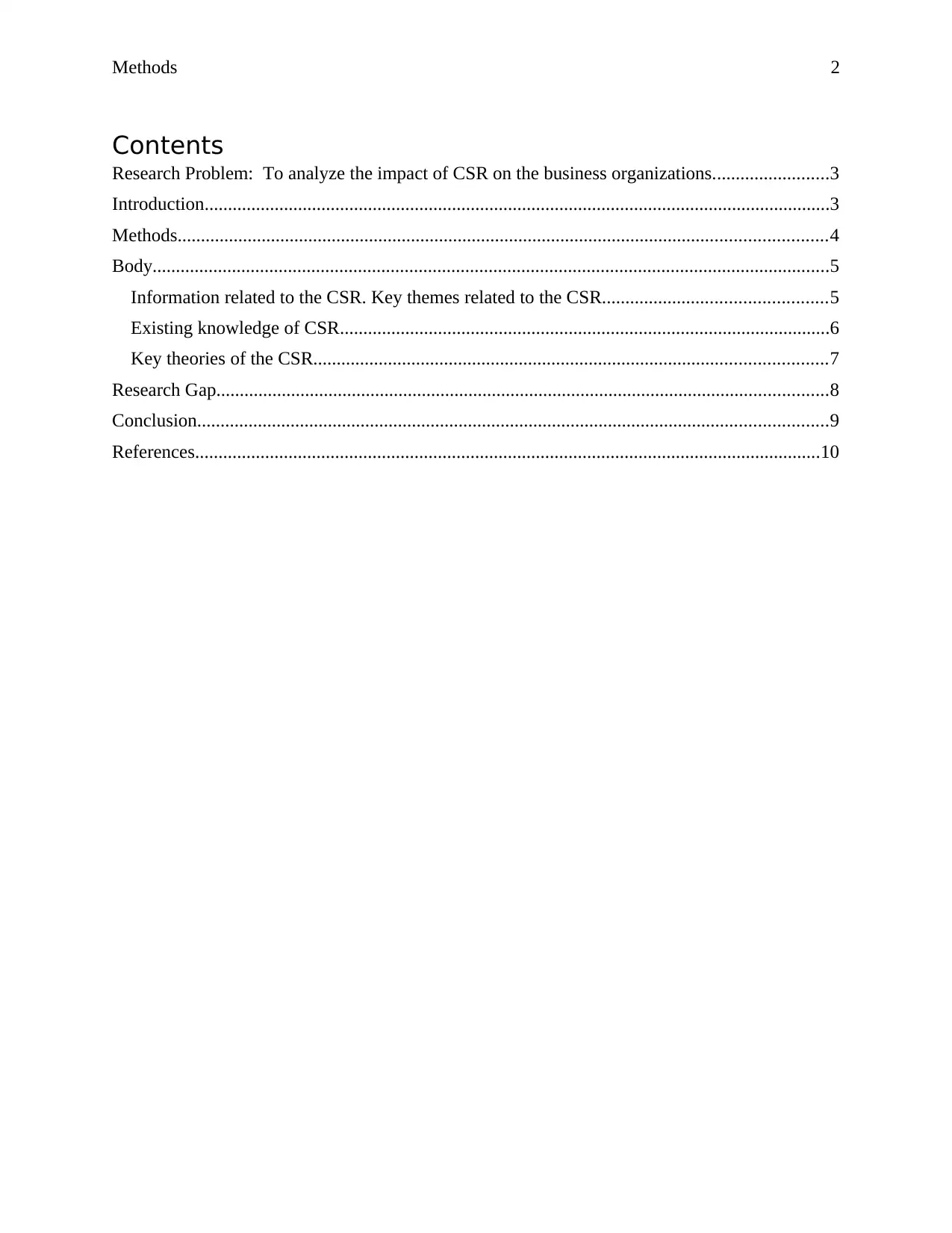
Methods 2
Contents
Research Problem: To analyze the impact of CSR on the business organizations.........................3
Introduction......................................................................................................................................3
Methods...........................................................................................................................................4
Body.................................................................................................................................................5
Information related to the CSR. Key themes related to the CSR................................................5
Existing knowledge of CSR.........................................................................................................6
Key theories of the CSR..............................................................................................................7
Research Gap...................................................................................................................................8
Conclusion.......................................................................................................................................9
References......................................................................................................................................10
Contents
Research Problem: To analyze the impact of CSR on the business organizations.........................3
Introduction......................................................................................................................................3
Methods...........................................................................................................................................4
Body.................................................................................................................................................5
Information related to the CSR. Key themes related to the CSR................................................5
Existing knowledge of CSR.........................................................................................................6
Key theories of the CSR..............................................................................................................7
Research Gap...................................................................................................................................8
Conclusion.......................................................................................................................................9
References......................................................................................................................................10
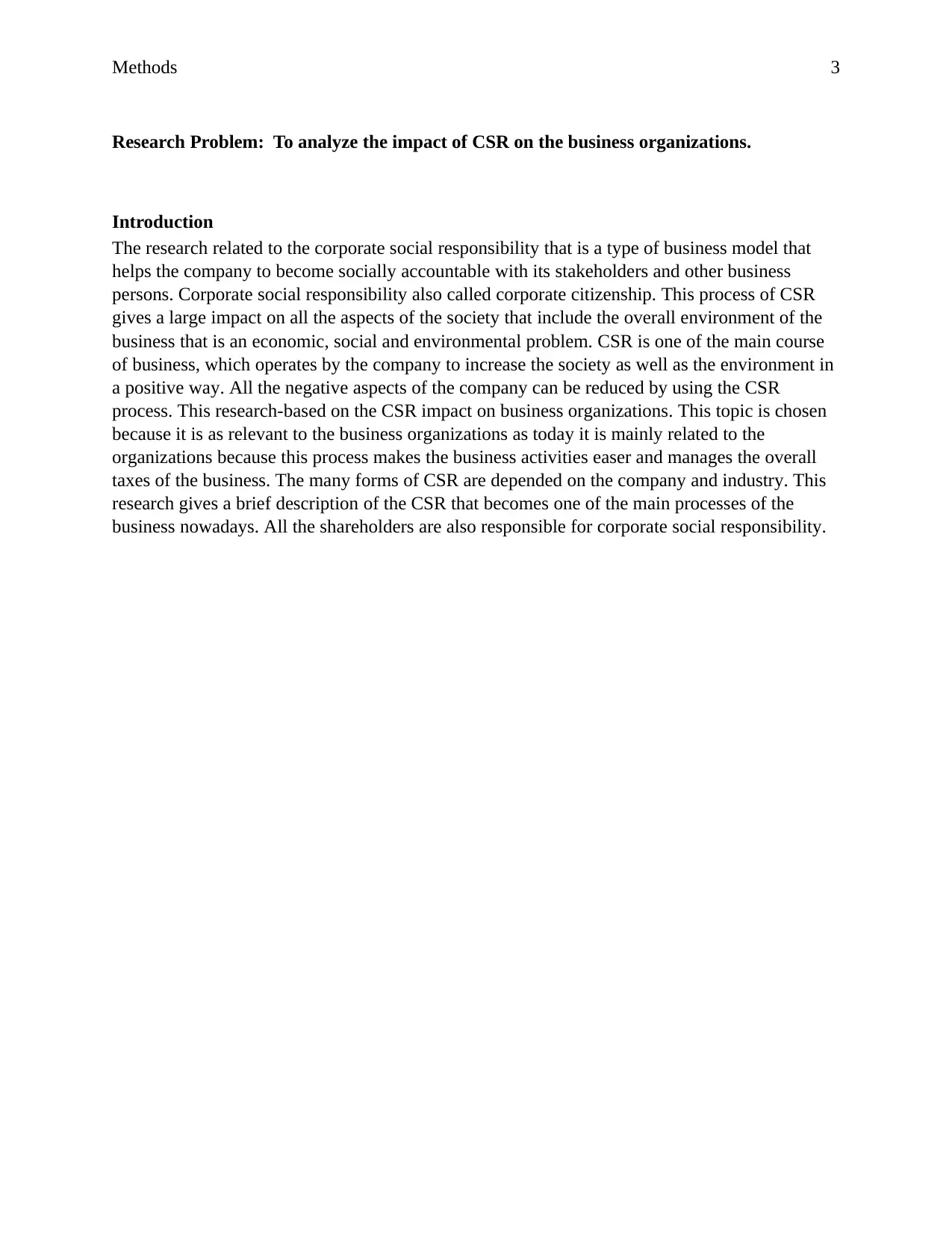
Methods 3
Research Problem: To analyze the impact of CSR on the business organizations.
Introduction
The research related to the corporate social responsibility that is a type of business model that
helps the company to become socially accountable with its stakeholders and other business
persons. Corporate social responsibility also called corporate citizenship. This process of CSR
gives a large impact on all the aspects of the society that include the overall environment of the
business that is an economic, social and environmental problem. CSR is one of the main course
of business, which operates by the company to increase the society as well as the environment in
a positive way. All the negative aspects of the company can be reduced by using the CSR
process. This research-based on the CSR impact on business organizations. This topic is chosen
because it is as relevant to the business organizations as today it is mainly related to the
organizations because this process makes the business activities easer and manages the overall
taxes of the business. The many forms of CSR are depended on the company and industry. This
research gives a brief description of the CSR that becomes one of the main processes of the
business nowadays. All the shareholders are also responsible for corporate social responsibility.
Research Problem: To analyze the impact of CSR on the business organizations.
Introduction
The research related to the corporate social responsibility that is a type of business model that
helps the company to become socially accountable with its stakeholders and other business
persons. Corporate social responsibility also called corporate citizenship. This process of CSR
gives a large impact on all the aspects of the society that include the overall environment of the
business that is an economic, social and environmental problem. CSR is one of the main course
of business, which operates by the company to increase the society as well as the environment in
a positive way. All the negative aspects of the company can be reduced by using the CSR
process. This research-based on the CSR impact on business organizations. This topic is chosen
because it is as relevant to the business organizations as today it is mainly related to the
organizations because this process makes the business activities easer and manages the overall
taxes of the business. The many forms of CSR are depended on the company and industry. This
research gives a brief description of the CSR that becomes one of the main processes of the
business nowadays. All the shareholders are also responsible for corporate social responsibility.
⊘ This is a preview!⊘
Do you want full access?
Subscribe today to unlock all pages.

Trusted by 1+ million students worldwide
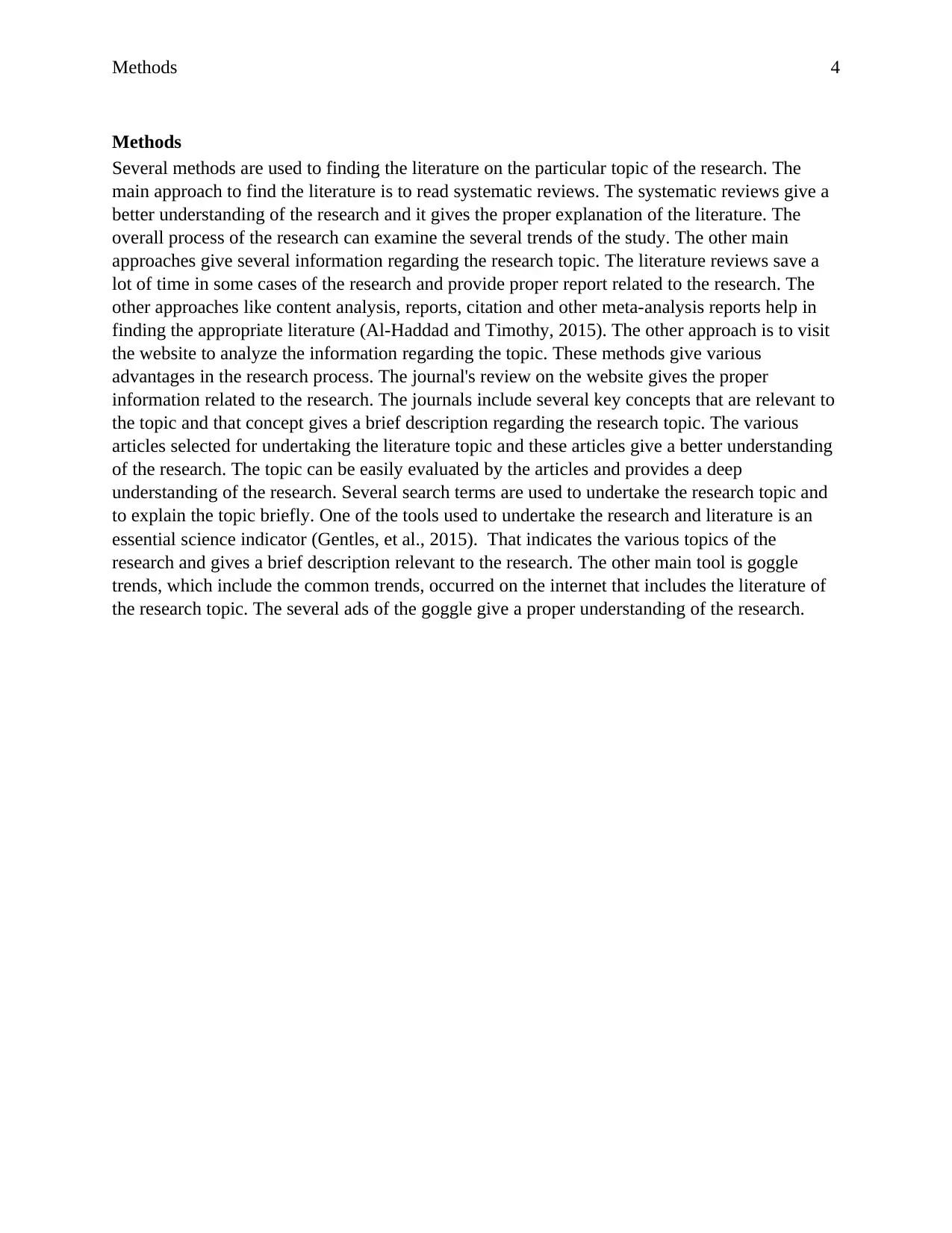
Methods 4
Methods
Several methods are used to finding the literature on the particular topic of the research. The
main approach to find the literature is to read systematic reviews. The systematic reviews give a
better understanding of the research and it gives the proper explanation of the literature. The
overall process of the research can examine the several trends of the study. The other main
approaches give several information regarding the research topic. The literature reviews save a
lot of time in some cases of the research and provide proper report related to the research. The
other approaches like content analysis, reports, citation and other meta-analysis reports help in
finding the appropriate literature (Al-Haddad and Timothy, 2015). The other approach is to visit
the website to analyze the information regarding the topic. These methods give various
advantages in the research process. The journal's review on the website gives the proper
information related to the research. The journals include several key concepts that are relevant to
the topic and that concept gives a brief description regarding the research topic. The various
articles selected for undertaking the literature topic and these articles give a better understanding
of the research. The topic can be easily evaluated by the articles and provides a deep
understanding of the research. Several search terms are used to undertake the research topic and
to explain the topic briefly. One of the tools used to undertake the research and literature is an
essential science indicator (Gentles, et al., 2015). That indicates the various topics of the
research and gives a brief description relevant to the research. The other main tool is goggle
trends, which include the common trends, occurred on the internet that includes the literature of
the research topic. The several ads of the goggle give a proper understanding of the research.
Methods
Several methods are used to finding the literature on the particular topic of the research. The
main approach to find the literature is to read systematic reviews. The systematic reviews give a
better understanding of the research and it gives the proper explanation of the literature. The
overall process of the research can examine the several trends of the study. The other main
approaches give several information regarding the research topic. The literature reviews save a
lot of time in some cases of the research and provide proper report related to the research. The
other approaches like content analysis, reports, citation and other meta-analysis reports help in
finding the appropriate literature (Al-Haddad and Timothy, 2015). The other approach is to visit
the website to analyze the information regarding the topic. These methods give various
advantages in the research process. The journal's review on the website gives the proper
information related to the research. The journals include several key concepts that are relevant to
the topic and that concept gives a brief description regarding the research topic. The various
articles selected for undertaking the literature topic and these articles give a better understanding
of the research. The topic can be easily evaluated by the articles and provides a deep
understanding of the research. Several search terms are used to undertake the research topic and
to explain the topic briefly. One of the tools used to undertake the research and literature is an
essential science indicator (Gentles, et al., 2015). That indicates the various topics of the
research and gives a brief description relevant to the research. The other main tool is goggle
trends, which include the common trends, occurred on the internet that includes the literature of
the research topic. The several ads of the goggle give a proper understanding of the research.
Paraphrase This Document
Need a fresh take? Get an instant paraphrase of this document with our AI Paraphraser
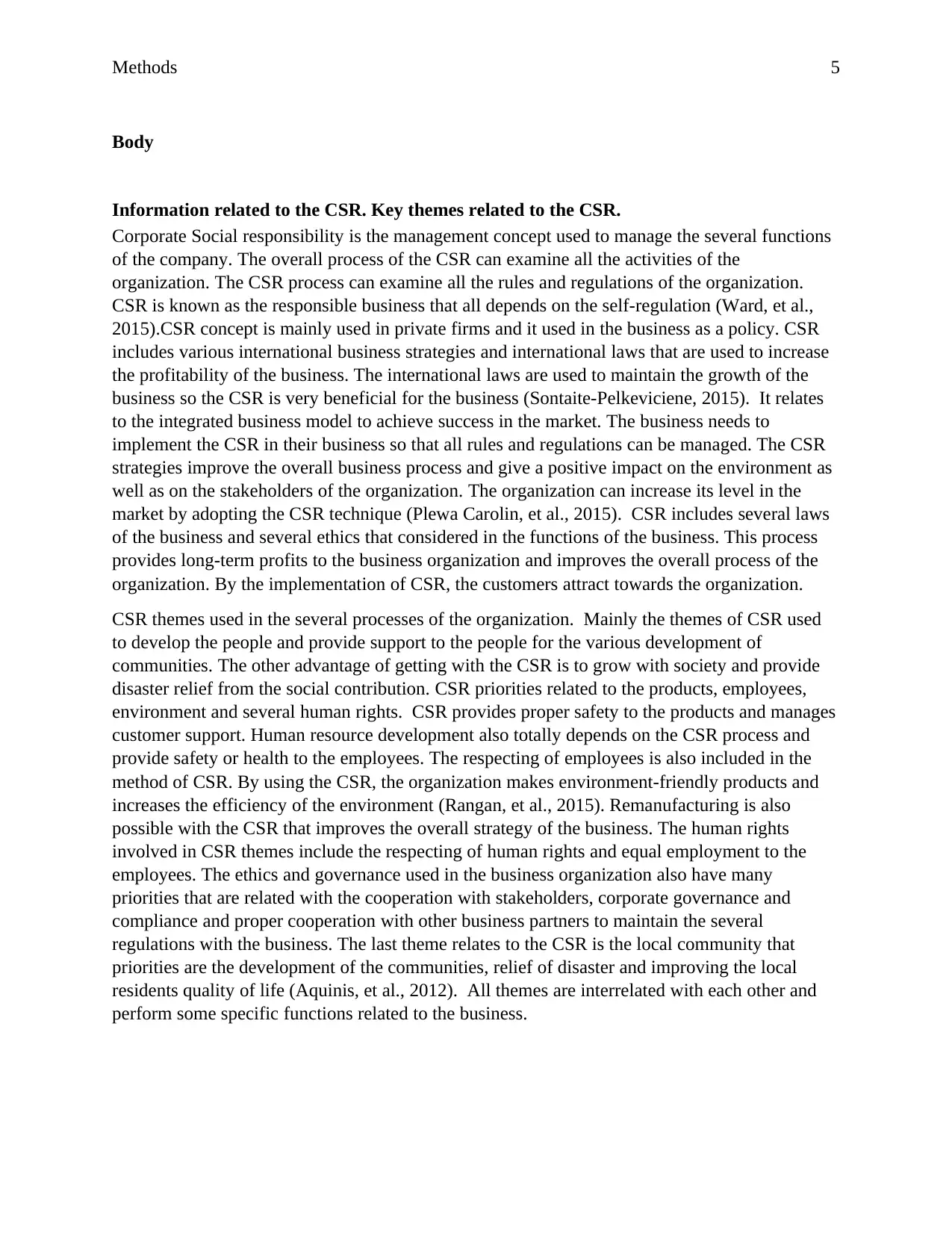
Methods 5
Body
Information related to the CSR. Key themes related to the CSR.
Corporate Social responsibility is the management concept used to manage the several functions
of the company. The overall process of the CSR can examine all the activities of the
organization. The CSR process can examine all the rules and regulations of the organization.
CSR is known as the responsible business that all depends on the self-regulation (Ward, et al.,
2015).CSR concept is mainly used in private firms and it used in the business as a policy. CSR
includes various international business strategies and international laws that are used to increase
the profitability of the business. The international laws are used to maintain the growth of the
business so the CSR is very beneficial for the business (Sontaite-Pelkeviciene, 2015). It relates
to the integrated business model to achieve success in the market. The business needs to
implement the CSR in their business so that all rules and regulations can be managed. The CSR
strategies improve the overall business process and give a positive impact on the environment as
well as on the stakeholders of the organization. The organization can increase its level in the
market by adopting the CSR technique (Plewa Carolin, et al., 2015). CSR includes several laws
of the business and several ethics that considered in the functions of the business. This process
provides long-term profits to the business organization and improves the overall process of the
organization. By the implementation of CSR, the customers attract towards the organization.
CSR themes used in the several processes of the organization. Mainly the themes of CSR used
to develop the people and provide support to the people for the various development of
communities. The other advantage of getting with the CSR is to grow with society and provide
disaster relief from the social contribution. CSR priorities related to the products, employees,
environment and several human rights. CSR provides proper safety to the products and manages
customer support. Human resource development also totally depends on the CSR process and
provide safety or health to the employees. The respecting of employees is also included in the
method of CSR. By using the CSR, the organization makes environment-friendly products and
increases the efficiency of the environment (Rangan, et al., 2015). Remanufacturing is also
possible with the CSR that improves the overall strategy of the business. The human rights
involved in CSR themes include the respecting of human rights and equal employment to the
employees. The ethics and governance used in the business organization also have many
priorities that are related with the cooperation with stakeholders, corporate governance and
compliance and proper cooperation with other business partners to maintain the several
regulations with the business. The last theme relates to the CSR is the local community that
priorities are the development of the communities, relief of disaster and improving the local
residents quality of life (Aquinis, et al., 2012). All themes are interrelated with each other and
perform some specific functions related to the business.
Body
Information related to the CSR. Key themes related to the CSR.
Corporate Social responsibility is the management concept used to manage the several functions
of the company. The overall process of the CSR can examine all the activities of the
organization. The CSR process can examine all the rules and regulations of the organization.
CSR is known as the responsible business that all depends on the self-regulation (Ward, et al.,
2015).CSR concept is mainly used in private firms and it used in the business as a policy. CSR
includes various international business strategies and international laws that are used to increase
the profitability of the business. The international laws are used to maintain the growth of the
business so the CSR is very beneficial for the business (Sontaite-Pelkeviciene, 2015). It relates
to the integrated business model to achieve success in the market. The business needs to
implement the CSR in their business so that all rules and regulations can be managed. The CSR
strategies improve the overall business process and give a positive impact on the environment as
well as on the stakeholders of the organization. The organization can increase its level in the
market by adopting the CSR technique (Plewa Carolin, et al., 2015). CSR includes several laws
of the business and several ethics that considered in the functions of the business. This process
provides long-term profits to the business organization and improves the overall process of the
organization. By the implementation of CSR, the customers attract towards the organization.
CSR themes used in the several processes of the organization. Mainly the themes of CSR used
to develop the people and provide support to the people for the various development of
communities. The other advantage of getting with the CSR is to grow with society and provide
disaster relief from the social contribution. CSR priorities related to the products, employees,
environment and several human rights. CSR provides proper safety to the products and manages
customer support. Human resource development also totally depends on the CSR process and
provide safety or health to the employees. The respecting of employees is also included in the
method of CSR. By using the CSR, the organization makes environment-friendly products and
increases the efficiency of the environment (Rangan, et al., 2015). Remanufacturing is also
possible with the CSR that improves the overall strategy of the business. The human rights
involved in CSR themes include the respecting of human rights and equal employment to the
employees. The ethics and governance used in the business organization also have many
priorities that are related with the cooperation with stakeholders, corporate governance and
compliance and proper cooperation with other business partners to maintain the several
regulations with the business. The last theme relates to the CSR is the local community that
priorities are the development of the communities, relief of disaster and improving the local
residents quality of life (Aquinis, et al., 2012). All themes are interrelated with each other and
perform some specific functions related to the business.
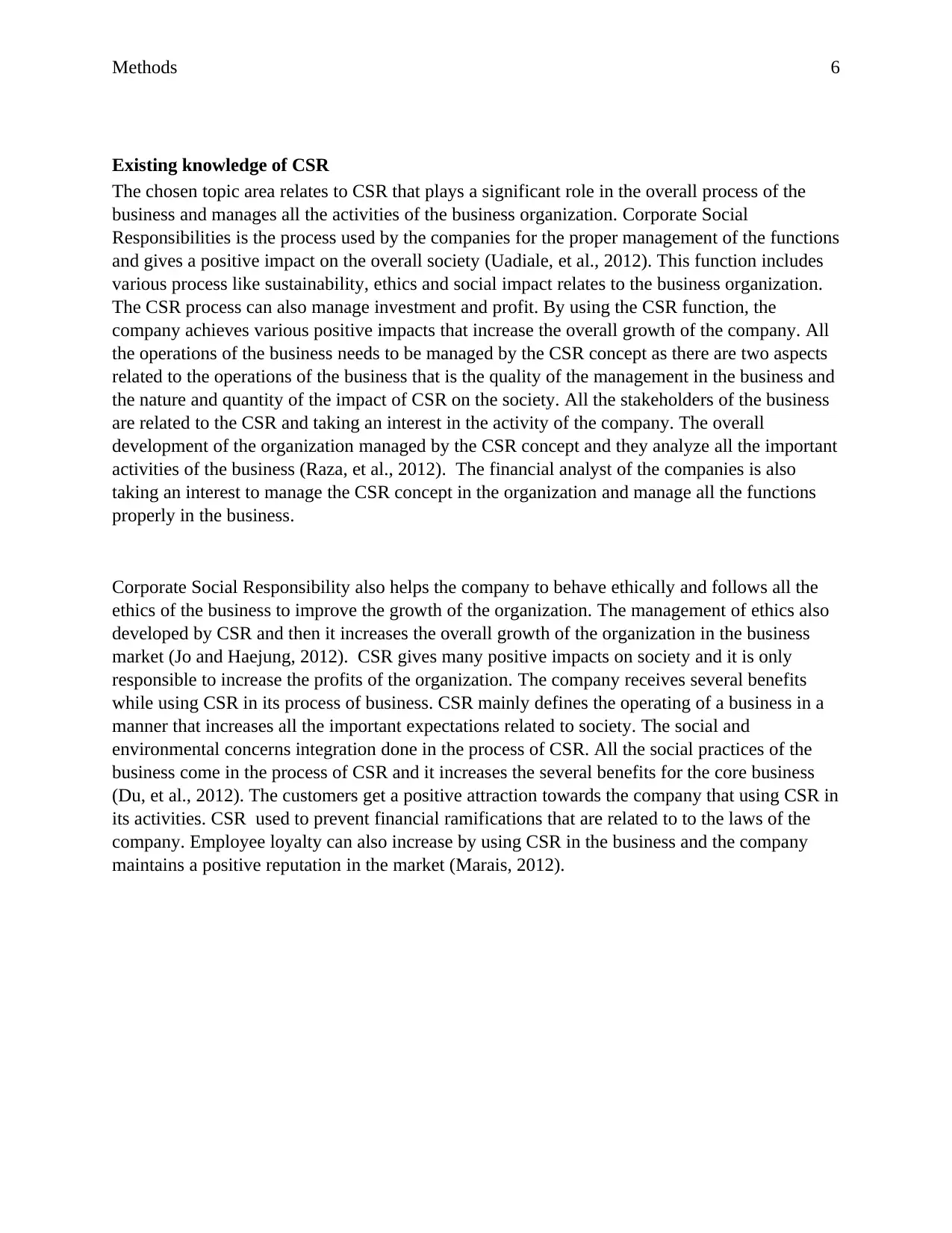
Methods 6
Existing knowledge of CSR
The chosen topic area relates to CSR that plays a significant role in the overall process of the
business and manages all the activities of the business organization. Corporate Social
Responsibilities is the process used by the companies for the proper management of the functions
and gives a positive impact on the overall society (Uadiale, et al., 2012). This function includes
various process like sustainability, ethics and social impact relates to the business organization.
The CSR process can also manage investment and profit. By using the CSR function, the
company achieves various positive impacts that increase the overall growth of the company. All
the operations of the business needs to be managed by the CSR concept as there are two aspects
related to the operations of the business that is the quality of the management in the business and
the nature and quantity of the impact of CSR on the society. All the stakeholders of the business
are related to the CSR and taking an interest in the activity of the company. The overall
development of the organization managed by the CSR concept and they analyze all the important
activities of the business (Raza, et al., 2012). The financial analyst of the companies is also
taking an interest to manage the CSR concept in the organization and manage all the functions
properly in the business.
Corporate Social Responsibility also helps the company to behave ethically and follows all the
ethics of the business to improve the growth of the organization. The management of ethics also
developed by CSR and then it increases the overall growth of the organization in the business
market (Jo and Haejung, 2012). CSR gives many positive impacts on society and it is only
responsible to increase the profits of the organization. The company receives several benefits
while using CSR in its process of business. CSR mainly defines the operating of a business in a
manner that increases all the important expectations related to society. The social and
environmental concerns integration done in the process of CSR. All the social practices of the
business come in the process of CSR and it increases the several benefits for the core business
(Du, et al., 2012). The customers get a positive attraction towards the company that using CSR in
its activities. CSR used to prevent financial ramifications that are related to to the laws of the
company. Employee loyalty can also increase by using CSR in the business and the company
maintains a positive reputation in the market (Marais, 2012).
Existing knowledge of CSR
The chosen topic area relates to CSR that plays a significant role in the overall process of the
business and manages all the activities of the business organization. Corporate Social
Responsibilities is the process used by the companies for the proper management of the functions
and gives a positive impact on the overall society (Uadiale, et al., 2012). This function includes
various process like sustainability, ethics and social impact relates to the business organization.
The CSR process can also manage investment and profit. By using the CSR function, the
company achieves various positive impacts that increase the overall growth of the company. All
the operations of the business needs to be managed by the CSR concept as there are two aspects
related to the operations of the business that is the quality of the management in the business and
the nature and quantity of the impact of CSR on the society. All the stakeholders of the business
are related to the CSR and taking an interest in the activity of the company. The overall
development of the organization managed by the CSR concept and they analyze all the important
activities of the business (Raza, et al., 2012). The financial analyst of the companies is also
taking an interest to manage the CSR concept in the organization and manage all the functions
properly in the business.
Corporate Social Responsibility also helps the company to behave ethically and follows all the
ethics of the business to improve the growth of the organization. The management of ethics also
developed by CSR and then it increases the overall growth of the organization in the business
market (Jo and Haejung, 2012). CSR gives many positive impacts on society and it is only
responsible to increase the profits of the organization. The company receives several benefits
while using CSR in its process of business. CSR mainly defines the operating of a business in a
manner that increases all the important expectations related to society. The social and
environmental concerns integration done in the process of CSR. All the social practices of the
business come in the process of CSR and it increases the several benefits for the core business
(Du, et al., 2012). The customers get a positive attraction towards the company that using CSR in
its activities. CSR used to prevent financial ramifications that are related to to the laws of the
company. Employee loyalty can also increase by using CSR in the business and the company
maintains a positive reputation in the market (Marais, 2012).
⊘ This is a preview!⊘
Do you want full access?
Subscribe today to unlock all pages.

Trusted by 1+ million students worldwide
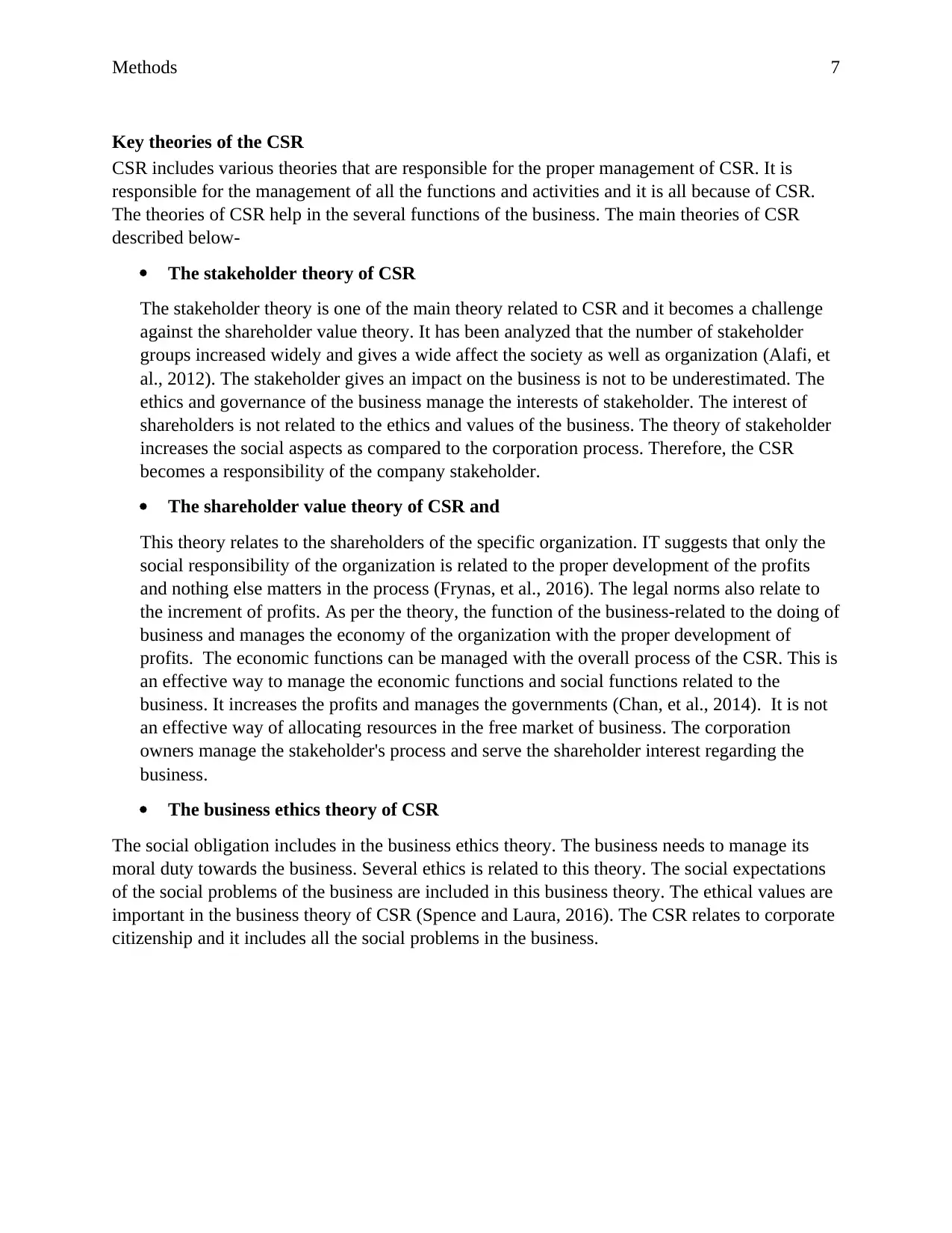
Methods 7
Key theories of the CSR
CSR includes various theories that are responsible for the proper management of CSR. It is
responsible for the management of all the functions and activities and it is all because of CSR.
The theories of CSR help in the several functions of the business. The main theories of CSR
described below-
The stakeholder theory of CSR
The stakeholder theory is one of the main theory related to CSR and it becomes a challenge
against the shareholder value theory. It has been analyzed that the number of stakeholder
groups increased widely and gives a wide affect the society as well as organization (Alafi, et
al., 2012). The stakeholder gives an impact on the business is not to be underestimated. The
ethics and governance of the business manage the interests of stakeholder. The interest of
shareholders is not related to the ethics and values of the business. The theory of stakeholder
increases the social aspects as compared to the corporation process. Therefore, the CSR
becomes a responsibility of the company stakeholder.
The shareholder value theory of CSR and
This theory relates to the shareholders of the specific organization. IT suggests that only the
social responsibility of the organization is related to the proper development of the profits
and nothing else matters in the process (Frynas, et al., 2016). The legal norms also relate to
the increment of profits. As per the theory, the function of the business-related to the doing of
business and manages the economy of the organization with the proper development of
profits. The economic functions can be managed with the overall process of the CSR. This is
an effective way to manage the economic functions and social functions related to the
business. It increases the profits and manages the governments (Chan, et al., 2014). It is not
an effective way of allocating resources in the free market of business. The corporation
owners manage the stakeholder's process and serve the shareholder interest regarding the
business.
The business ethics theory of CSR
The social obligation includes in the business ethics theory. The business needs to manage its
moral duty towards the business. Several ethics is related to this theory. The social expectations
of the social problems of the business are included in this business theory. The ethical values are
important in the business theory of CSR (Spence and Laura, 2016). The CSR relates to corporate
citizenship and it includes all the social problems in the business.
Key theories of the CSR
CSR includes various theories that are responsible for the proper management of CSR. It is
responsible for the management of all the functions and activities and it is all because of CSR.
The theories of CSR help in the several functions of the business. The main theories of CSR
described below-
The stakeholder theory of CSR
The stakeholder theory is one of the main theory related to CSR and it becomes a challenge
against the shareholder value theory. It has been analyzed that the number of stakeholder
groups increased widely and gives a wide affect the society as well as organization (Alafi, et
al., 2012). The stakeholder gives an impact on the business is not to be underestimated. The
ethics and governance of the business manage the interests of stakeholder. The interest of
shareholders is not related to the ethics and values of the business. The theory of stakeholder
increases the social aspects as compared to the corporation process. Therefore, the CSR
becomes a responsibility of the company stakeholder.
The shareholder value theory of CSR and
This theory relates to the shareholders of the specific organization. IT suggests that only the
social responsibility of the organization is related to the proper development of the profits
and nothing else matters in the process (Frynas, et al., 2016). The legal norms also relate to
the increment of profits. As per the theory, the function of the business-related to the doing of
business and manages the economy of the organization with the proper development of
profits. The economic functions can be managed with the overall process of the CSR. This is
an effective way to manage the economic functions and social functions related to the
business. It increases the profits and manages the governments (Chan, et al., 2014). It is not
an effective way of allocating resources in the free market of business. The corporation
owners manage the stakeholder's process and serve the shareholder interest regarding the
business.
The business ethics theory of CSR
The social obligation includes in the business ethics theory. The business needs to manage its
moral duty towards the business. Several ethics is related to this theory. The social expectations
of the social problems of the business are included in this business theory. The ethical values are
important in the business theory of CSR (Spence and Laura, 2016). The CSR relates to corporate
citizenship and it includes all the social problems in the business.
Paraphrase This Document
Need a fresh take? Get an instant paraphrase of this document with our AI Paraphraser
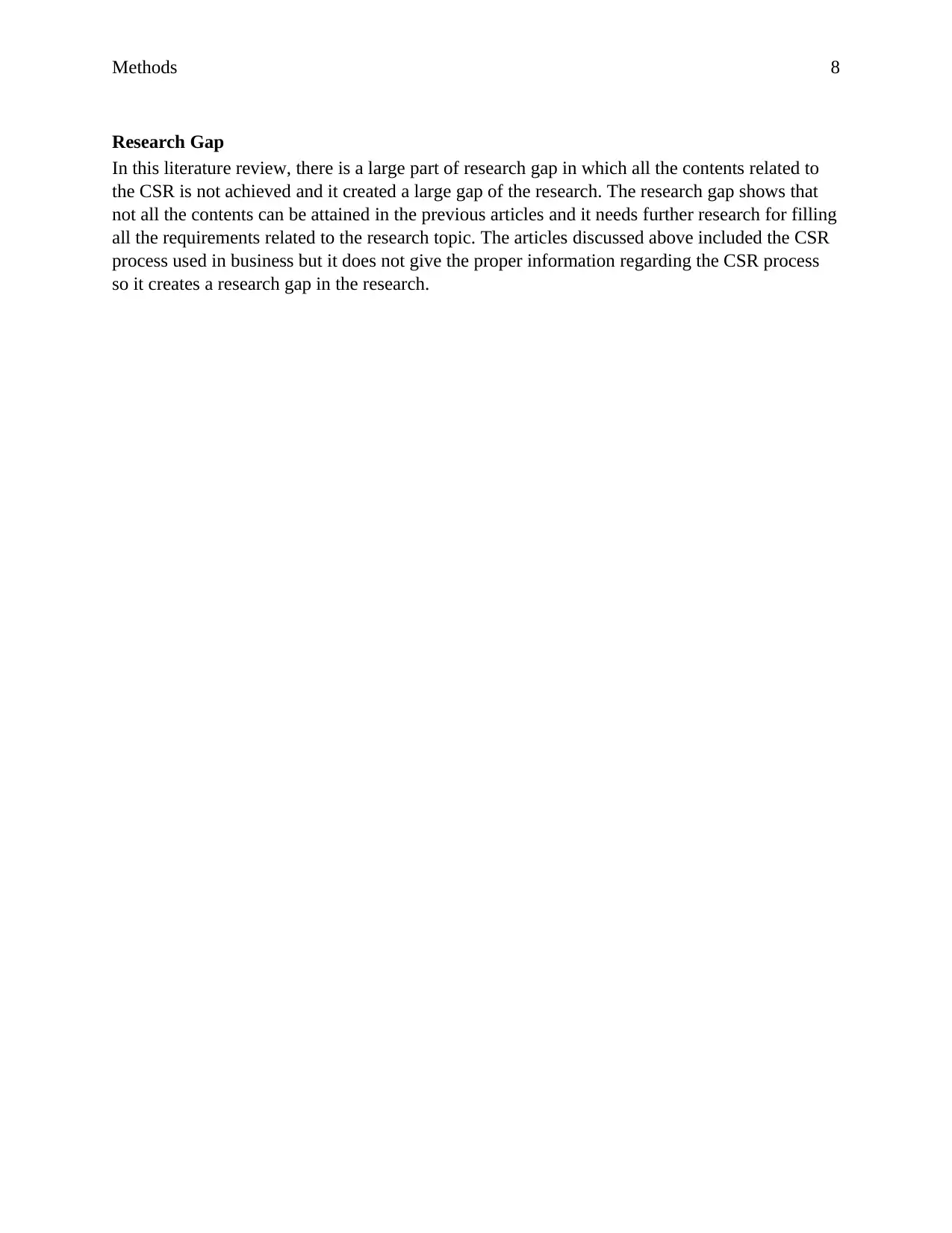
Methods 8
Research Gap
In this literature review, there is a large part of research gap in which all the contents related to
the CSR is not achieved and it created a large gap of the research. The research gap shows that
not all the contents can be attained in the previous articles and it needs further research for filling
all the requirements related to the research topic. The articles discussed above included the CSR
process used in business but it does not give the proper information regarding the CSR process
so it creates a research gap in the research.
Research Gap
In this literature review, there is a large part of research gap in which all the contents related to
the CSR is not achieved and it created a large gap of the research. The research gap shows that
not all the contents can be attained in the previous articles and it needs further research for filling
all the requirements related to the research topic. The articles discussed above included the CSR
process used in business but it does not give the proper information regarding the CSR process
so it creates a research gap in the research.
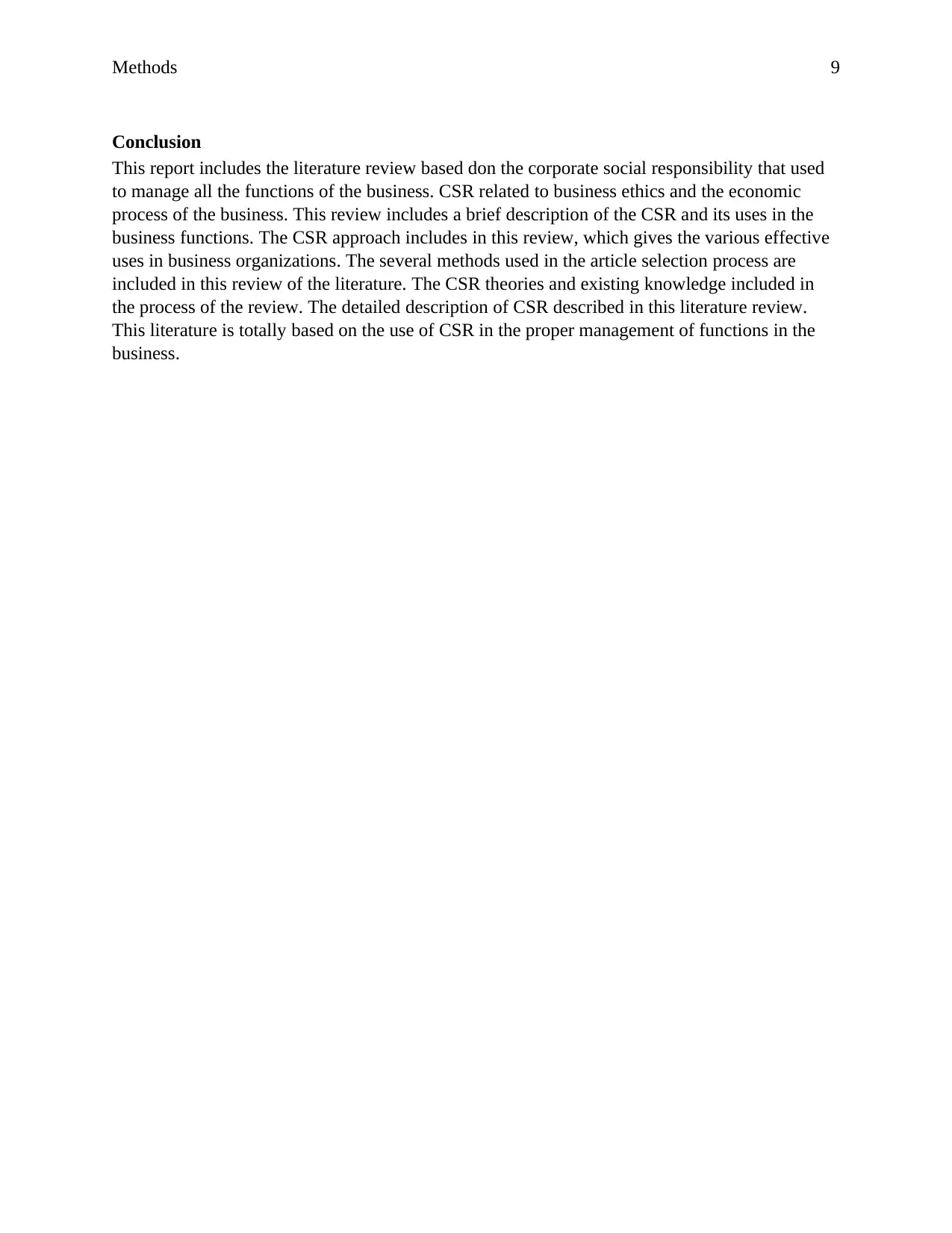
Methods 9
Conclusion
This report includes the literature review based don the corporate social responsibility that used
to manage all the functions of the business. CSR related to business ethics and the economic
process of the business. This review includes a brief description of the CSR and its uses in the
business functions. The CSR approach includes in this review, which gives the various effective
uses in business organizations. The several methods used in the article selection process are
included in this review of the literature. The CSR theories and existing knowledge included in
the process of the review. The detailed description of CSR described in this literature review.
This literature is totally based on the use of CSR in the proper management of functions in the
business.
Conclusion
This report includes the literature review based don the corporate social responsibility that used
to manage all the functions of the business. CSR related to business ethics and the economic
process of the business. This review includes a brief description of the CSR and its uses in the
business functions. The CSR approach includes in this review, which gives the various effective
uses in business organizations. The several methods used in the article selection process are
included in this review of the literature. The CSR theories and existing knowledge included in
the process of the review. The detailed description of CSR described in this literature review.
This literature is totally based on the use of CSR in the proper management of functions in the
business.
⊘ This is a preview!⊘
Do you want full access?
Subscribe today to unlock all pages.

Trusted by 1+ million students worldwide
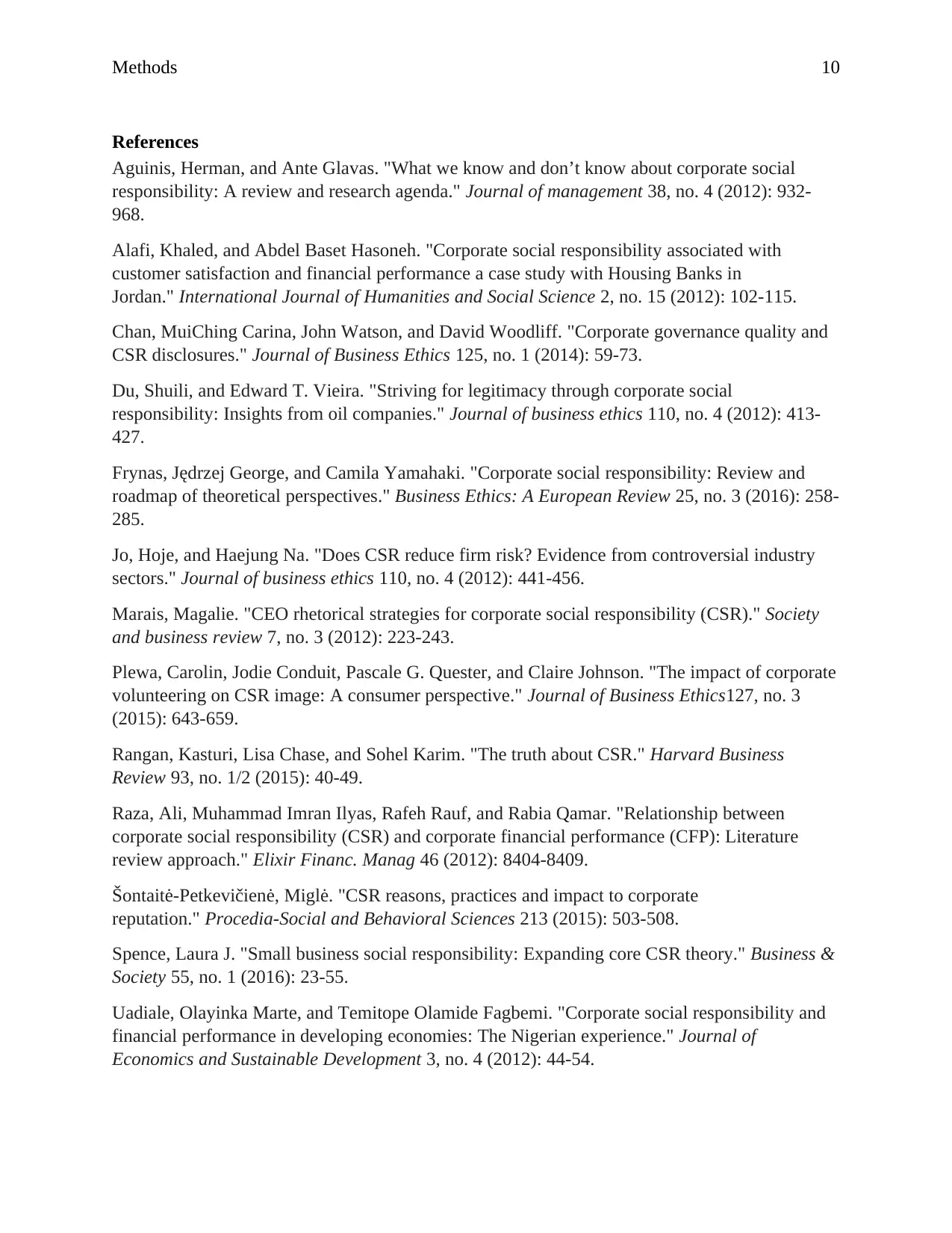
Methods 10
References
Aguinis, Herman, and Ante Glavas. "What we know and don’t know about corporate social
responsibility: A review and research agenda." Journal of management 38, no. 4 (2012): 932-
968.
Alafi, Khaled, and Abdel Baset Hasoneh. "Corporate social responsibility associated with
customer satisfaction and financial performance a case study with Housing Banks in
Jordan." International Journal of Humanities and Social Science 2, no. 15 (2012): 102-115.
Chan, MuiChing Carina, John Watson, and David Woodliff. "Corporate governance quality and
CSR disclosures." Journal of Business Ethics 125, no. 1 (2014): 59-73.
Du, Shuili, and Edward T. Vieira. "Striving for legitimacy through corporate social
responsibility: Insights from oil companies." Journal of business ethics 110, no. 4 (2012): 413-
427.
Frynas, Jędrzej George, and Camila Yamahaki. "Corporate social responsibility: Review and
roadmap of theoretical perspectives." Business Ethics: A European Review 25, no. 3 (2016): 258-
285.
Jo, Hoje, and Haejung Na. "Does CSR reduce firm risk? Evidence from controversial industry
sectors." Journal of business ethics 110, no. 4 (2012): 441-456.
Marais, Magalie. "CEO rhetorical strategies for corporate social responsibility (CSR)." Society
and business review 7, no. 3 (2012): 223-243.
Plewa, Carolin, Jodie Conduit, Pascale G. Quester, and Claire Johnson. "The impact of corporate
volunteering on CSR image: A consumer perspective." Journal of Business Ethics127, no. 3
(2015): 643-659.
Rangan, Kasturi, Lisa Chase, and Sohel Karim. "The truth about CSR." Harvard Business
Review 93, no. 1/2 (2015): 40-49.
Raza, Ali, Muhammad Imran Ilyas, Rafeh Rauf, and Rabia Qamar. "Relationship between
corporate social responsibility (CSR) and corporate financial performance (CFP): Literature
review approach." Elixir Financ. Manag 46 (2012): 8404-8409.
Šontaitė-Petkevičienė, Miglė. "CSR reasons, practices and impact to corporate
reputation." Procedia-Social and Behavioral Sciences 213 (2015): 503-508.
Spence, Laura J. "Small business social responsibility: Expanding core CSR theory." Business &
Society 55, no. 1 (2016): 23-55.
Uadiale, Olayinka Marte, and Temitope Olamide Fagbemi. "Corporate social responsibility and
financial performance in developing economies: The Nigerian experience." Journal of
Economics and Sustainable Development 3, no. 4 (2012): 44-54.
References
Aguinis, Herman, and Ante Glavas. "What we know and don’t know about corporate social
responsibility: A review and research agenda." Journal of management 38, no. 4 (2012): 932-
968.
Alafi, Khaled, and Abdel Baset Hasoneh. "Corporate social responsibility associated with
customer satisfaction and financial performance a case study with Housing Banks in
Jordan." International Journal of Humanities and Social Science 2, no. 15 (2012): 102-115.
Chan, MuiChing Carina, John Watson, and David Woodliff. "Corporate governance quality and
CSR disclosures." Journal of Business Ethics 125, no. 1 (2014): 59-73.
Du, Shuili, and Edward T. Vieira. "Striving for legitimacy through corporate social
responsibility: Insights from oil companies." Journal of business ethics 110, no. 4 (2012): 413-
427.
Frynas, Jędrzej George, and Camila Yamahaki. "Corporate social responsibility: Review and
roadmap of theoretical perspectives." Business Ethics: A European Review 25, no. 3 (2016): 258-
285.
Jo, Hoje, and Haejung Na. "Does CSR reduce firm risk? Evidence from controversial industry
sectors." Journal of business ethics 110, no. 4 (2012): 441-456.
Marais, Magalie. "CEO rhetorical strategies for corporate social responsibility (CSR)." Society
and business review 7, no. 3 (2012): 223-243.
Plewa, Carolin, Jodie Conduit, Pascale G. Quester, and Claire Johnson. "The impact of corporate
volunteering on CSR image: A consumer perspective." Journal of Business Ethics127, no. 3
(2015): 643-659.
Rangan, Kasturi, Lisa Chase, and Sohel Karim. "The truth about CSR." Harvard Business
Review 93, no. 1/2 (2015): 40-49.
Raza, Ali, Muhammad Imran Ilyas, Rafeh Rauf, and Rabia Qamar. "Relationship between
corporate social responsibility (CSR) and corporate financial performance (CFP): Literature
review approach." Elixir Financ. Manag 46 (2012): 8404-8409.
Šontaitė-Petkevičienė, Miglė. "CSR reasons, practices and impact to corporate
reputation." Procedia-Social and Behavioral Sciences 213 (2015): 503-508.
Spence, Laura J. "Small business social responsibility: Expanding core CSR theory." Business &
Society 55, no. 1 (2016): 23-55.
Uadiale, Olayinka Marte, and Temitope Olamide Fagbemi. "Corporate social responsibility and
financial performance in developing economies: The Nigerian experience." Journal of
Economics and Sustainable Development 3, no. 4 (2012): 44-54.
Paraphrase This Document
Need a fresh take? Get an instant paraphrase of this document with our AI Paraphraser
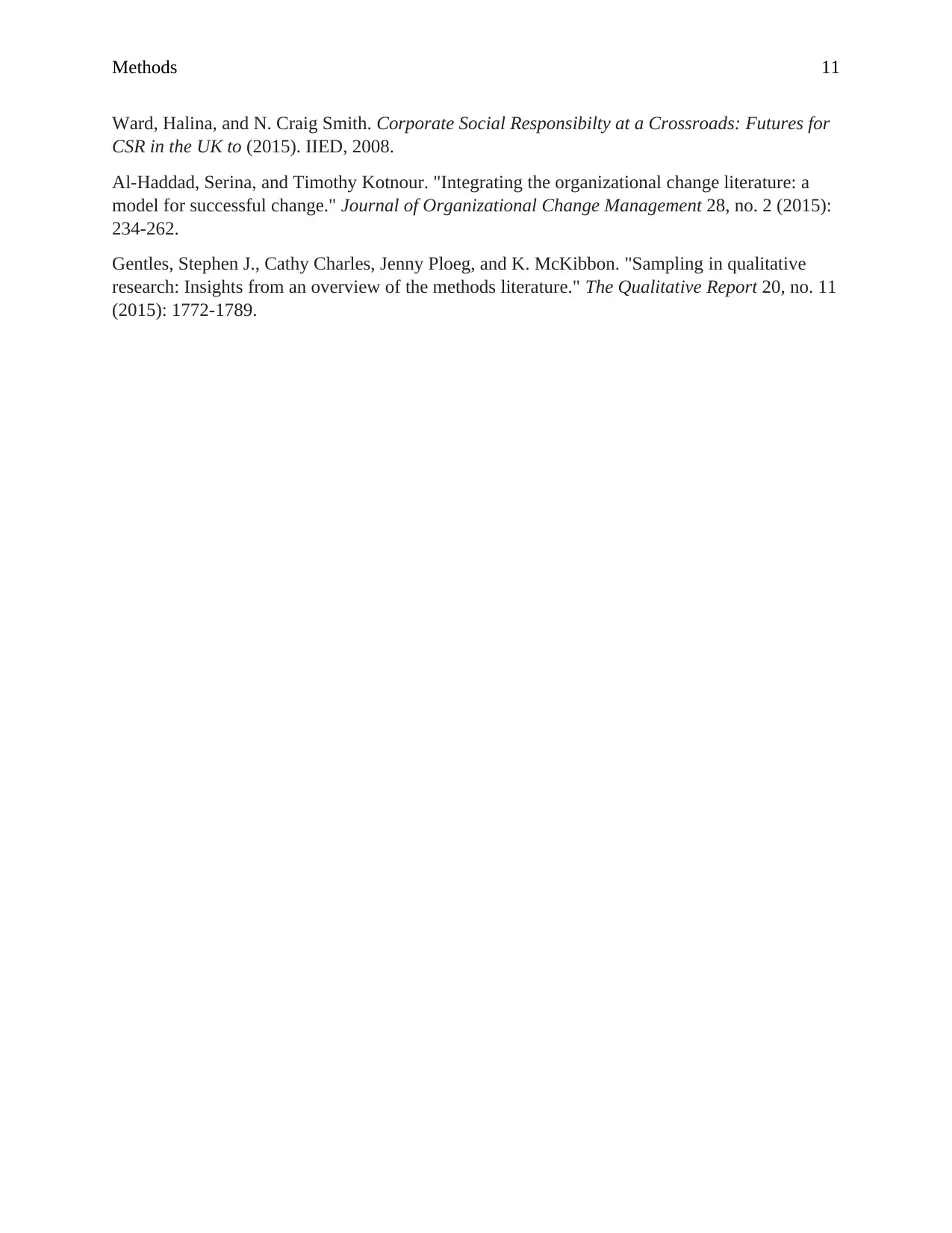
Methods 11
Ward, Halina, and N. Craig Smith. Corporate Social Responsibilty at a Crossroads: Futures for
CSR in the UK to (2015). IIED, 2008.
Al-Haddad, Serina, and Timothy Kotnour. "Integrating the organizational change literature: a
model for successful change." Journal of Organizational Change Management 28, no. 2 (2015):
234-262.
Gentles, Stephen J., Cathy Charles, Jenny Ploeg, and K. McKibbon. "Sampling in qualitative
research: Insights from an overview of the methods literature." The Qualitative Report 20, no. 11
(2015): 1772-1789.
Ward, Halina, and N. Craig Smith. Corporate Social Responsibilty at a Crossroads: Futures for
CSR in the UK to (2015). IIED, 2008.
Al-Haddad, Serina, and Timothy Kotnour. "Integrating the organizational change literature: a
model for successful change." Journal of Organizational Change Management 28, no. 2 (2015):
234-262.
Gentles, Stephen J., Cathy Charles, Jenny Ploeg, and K. McKibbon. "Sampling in qualitative
research: Insights from an overview of the methods literature." The Qualitative Report 20, no. 11
(2015): 1772-1789.
1 out of 11
Related Documents
Your All-in-One AI-Powered Toolkit for Academic Success.
+13062052269
info@desklib.com
Available 24*7 on WhatsApp / Email
![[object Object]](/_next/static/media/star-bottom.7253800d.svg)
Unlock your academic potential
Copyright © 2020–2026 A2Z Services. All Rights Reserved. Developed and managed by ZUCOL.





